<> Papilio paris (Linnaeus, 1758) <>
the Paris Peacock ผีเสื้อหางติ่งปารีส
Click on any photo to see all photos full size in Lightbox
Additions and corrections to the information provided on this page is always welcome. Please use the Contact form.
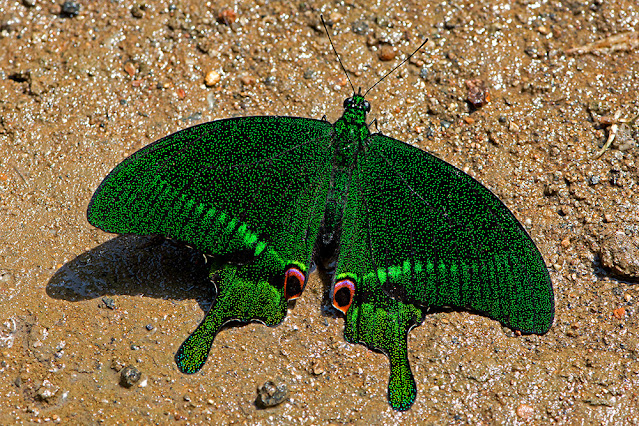
Photo taken at Chiang Dao Nature Sanctuary, Chiang Mai, Thailand. 540m a.s.l.

A remarkable species that is widely distributed throughout most of the region. The sexes look similar to each other but the female is slightly larger and paler in colour. What makes this species so special is its visual appearance with iridescent scales on its wings. The iridescence is produced by microscopic ridges and facets on the surface of the scale that reflects the light and makes the butterfly really stand out from the crowd. There is also a large blue discal patch on the upperside of the hindwing on both males and females, although this is often difficult to see as it is covered by the forewing when the butterfly is resting on the ground.
Both sexes visit flowers and the males are seen regularly mud puddling along the banks of streams. When puddling it keeps flapping its wings at first but as it settles down stops and then spreads its wings flat. They are fast and powerful fliers. Papilio paris is multivoltine with several broods per annum. The adult female lays around 90 eggs in total on leaves of the host plant.
Synonyms and previously used names: none
Taxonomy: Animalia - Arthropoda - Insecta - Lepidoptera - Papilionidae - Papilioninae - Papilio - paris
Regional subspecies: P.paris battacorum (Indonesia), P.paris gedeensis (Indonesia), P.paris hermosanus (Taiwan), P.paris nakaharai (N.Taiwan), P.paris paris (Nepal, NE India, Myanmar, Thailand, Laos, Cambodia, Vietnam, SW China)
Regional Distribution: India, Nepal, Bhutan, Bangladesh, Myanmar, Thailand, Laos, Cambodia, Vietnam, S.China, Taiwan, Malaysia, Indonesia, Philippines
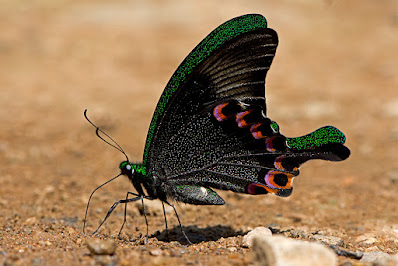 |
Chiang Dao Nature Sanctuary, Chiang Mai, Thailand. 540m a.s.l. |
Habitat: Papilio paris is predominantly a forest species and is found in rainforest and moist evergreen montane forest, usually near streams. Very occasionally it is seen in urban environments. It has been recorded at elevations up to 2300m a.s.l.
Flight time: all year, depending on location. Wingspan: 95-110mm
Life History: egg 6 days instar 1 3-4 days instar 2 4 days instar 3 4-5 days instar 4 4-5 days instar 5 5-6 days pupa 16-17 days Total egg-adult 43-46 days. All times are approximate.
Larval Hosts: Melicope lunu-ankenda, Melicope pteleifolia, Melicope semecarpifolia, Tetradium glabrifolium, Zanthoxylum armatum, Zanthoxylum asiaticum, Zanthoxylum avicennae, Zanthoxylum nitidum, Zanthoxylum ovalifolium, Zanthoxylum oxyphyllum, Zanthoxylum rhetsa (Rutaceae).
Actual host plant used depends upon location and availabilty of plant species.
Adult Food Sources: Nectar - Lantana camara (Verbenaceae), Euphorbia pulcherrima (Euphorbiaceae), Zanthoxylum avicennae (Rutaceae), Impatiens walleriana (Balsaminaceae), Bidens alba, Bidens pilosa (Asteraceae), Bougainvillea spectabilis (Nyctaginaceae). NOTE: there may be other nectar sources that have yet to be recorded. Other - mud puddling
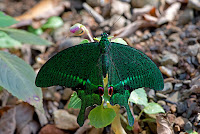 |
| Chiang Dao Nature Sanctuary, Chiang Mai, Thailand |
 |
| Chiang Dao Nature Sanctuary, Chiang Mai, Thailand |
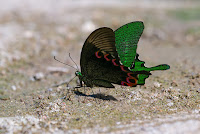 |
| Doi Suthep-Pui National Park, Chiang Mai, Thailand |
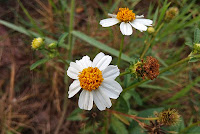 |
| Bidens pilosa, a nectar source |
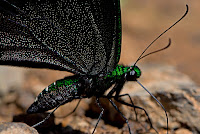 |
| Chiang Dao Nature Sanctuary, Chiang Mai, Thailand |
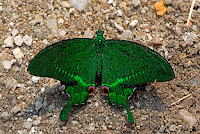 |
| Doi Suthep-Pui National Park, Chiang Mai, Thailand |
 |
| Tetradium glabrifolium, a larval host |
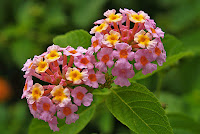 |
| Lantana camara, another nectar source |
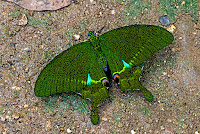 |
| Chiang Dao Nature Sanctuary, Chiang Mai, Thailand |
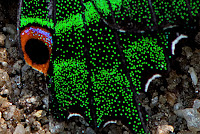 |
| close-up of the iridescent green wing markings |
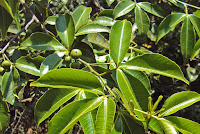 |
| Zanthoxylum asiaticum, another larval host |
 |
| late instar larva |
Links to other pages in this series for species in the same subfamily
Graphium sarpedon
Papilio chaon
Papilio paris
